Today there are about 103 different self hosted email servers to host your company email communications on. We spent 120 hours comparing the top 50 to find the seven best you can use to guarantee privacy, protection, and scalability.
What are the Best Self Hosted Email Servers?
- MailWizz — best of the best
- iRedMail — best open source solution
- Modoboa — best for customization
- Mail-in-a-Box — best for simplicity
- Zimbra — best for collaboration
- hMailServer — best for flexibility
- Postfix — best for reliability
1. MailWizz
Our Verdict — Best Of The Best
Price: Starts at $79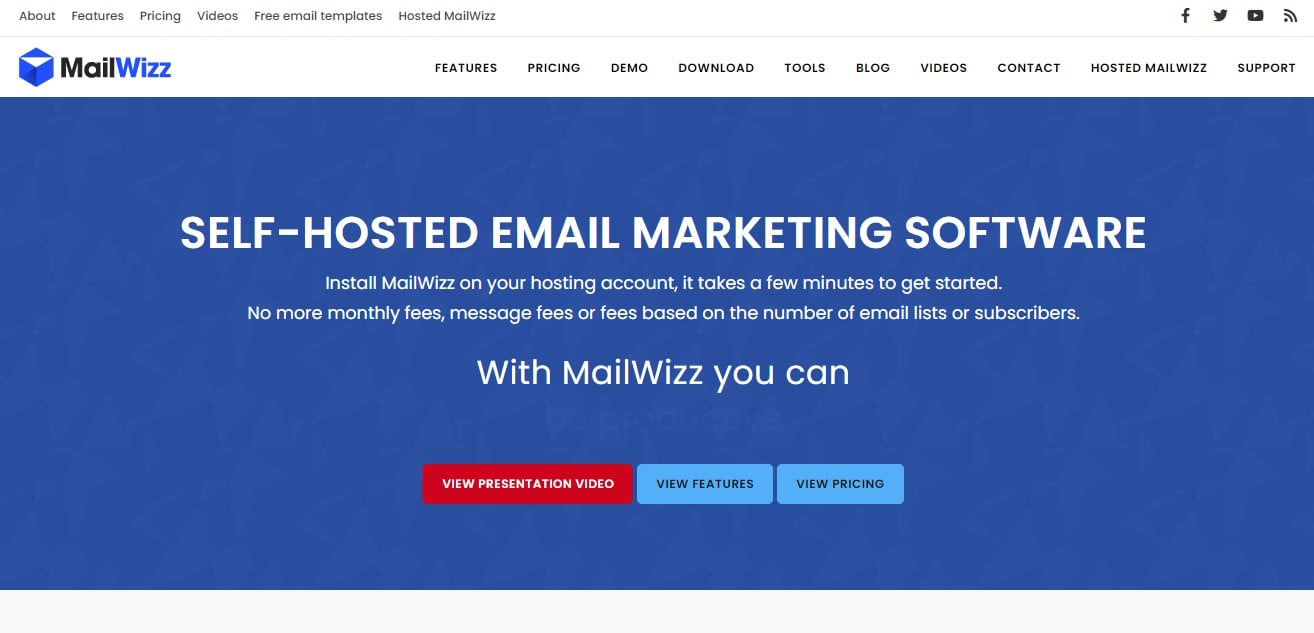
MailWizz is one of the most famous self hosted email solutions for good reason. We think it’s the best because of its lightweight.
The Best Part:
- Light as a butterfly. MailWizz is written in PHP and uses MySQL as its database. Not only is it quick and light, but it can run in pretty much any web hosting account.
The Worst Part:
- Not the easiest on the eyes. The user interface has room for improvement, as it’s not the most friendly one out there.
Get it if you want a real solid self hosted email server that will do the work.
I recommend you get started with the Regular license for $79.
(one time fee)
Best For
MailWizz is best for businesses looking for a self hosted email server that won’t let them down.
Top Features
- Battle tested. MailWizz has been around since 2013, being continuously developed and enhanced. Rock solid.
- It’s developer friendly. You can find tons of themes, extensions, apps, and third-party integrations to set up MailWizz just the right way.
- No BS support. MailWizz goes above and beyond to help customers, even when issues are not directly related to MailWizz.
- Unlimited everything. Contacts, email lists, segments, campaigns, surveys… There’s no limit to what you can do and achieve with MailWizz.
- Great performance. MailWizz doesn’t leave you hanging. It loads quickly after every click. Brace yourself for a smooth experience.
Pricing
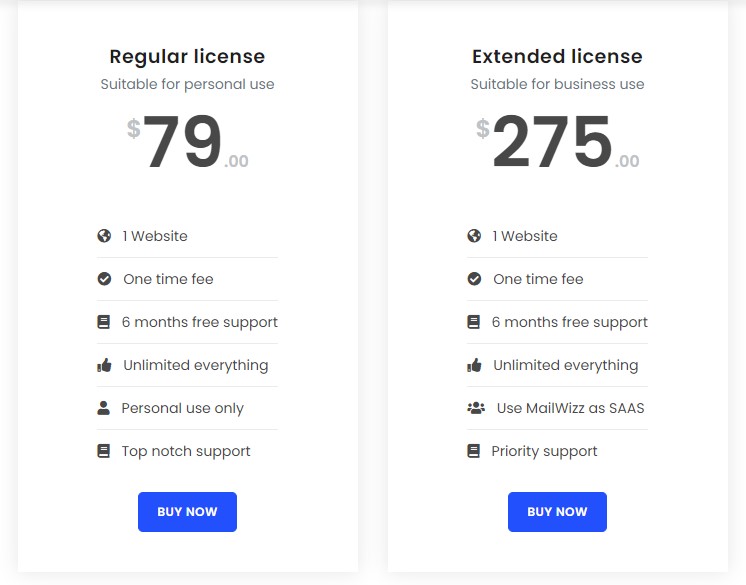
MailWizz offers two pricing plans:
- Regular License. $79 one time fee, for users wanting to run email campaigns for their businesses.
- Extended License. $275 one time fee, for users wanting to set up an email autoresponder business.
Try MailWizz today with a one-time fee.
2. iRedMail
Our Verdict — Best Open Source Solution
Price: Starts at $499/year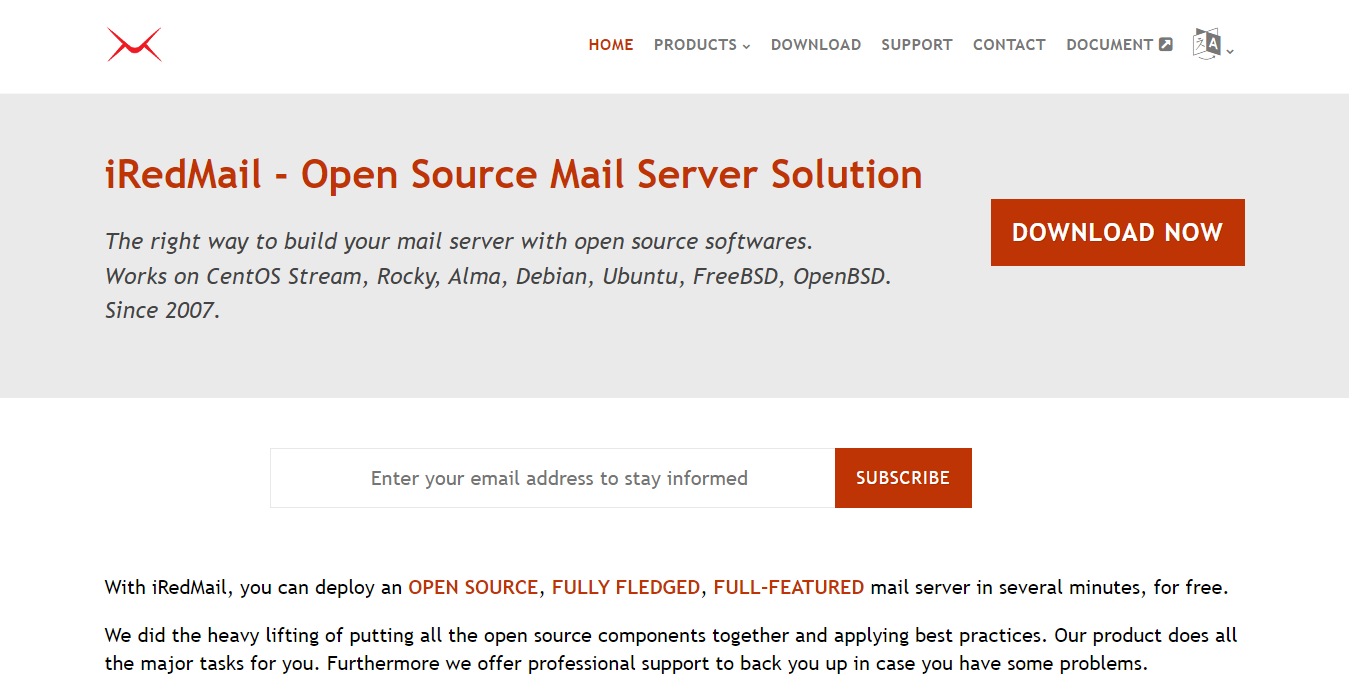
iRedMail is a full-featured mail server solution that is easy to install and maintain. We think it's the best open source solution because it's super easy to find resources and support within its community of users.
The Best Part:
- Easy to install and set up. iRedMail sports a simple web-based interface anyone with zero technical knowledge can figure out.
The Worst Part:
- Poor customer support. While iRedMail is incredibly easy to set up, it seems like the customer support team may take some time to respond, as we found on a few online reviews.
Get it if you want a self hosting email server primarily designed for Linux-based systems.
I recommend you get started for $499/year on the One year plan, then upgrade to the Three plan for $899/year if it works for your business.
(free plan)
Best For
iRedMail is best for businesses that want a free, open-source mail server solution for their Linux-based systems.
Top Features
- Templated deployment. Migrating an old server, or restoring a crashed server is easy and quick.
- No account limits. You can create as many domains, users, mailing lists, and admins as you want without ever paying extra charges.
- Sturdy security features. iRedMail employs antivirus and spam protection capabilities to keep your inboxes clean as a whistle.
- Web installer and webmail. You can set up your email server on your website with a few clicks. You can also use Roundcube webmail or/and SOGo groupware to manage mails, folders, sieve filters, and vacations, which are intuitive and easy to use.
- Go mobile. Manage your calendars, address books , and tasks from your mobile phone.
Pricing
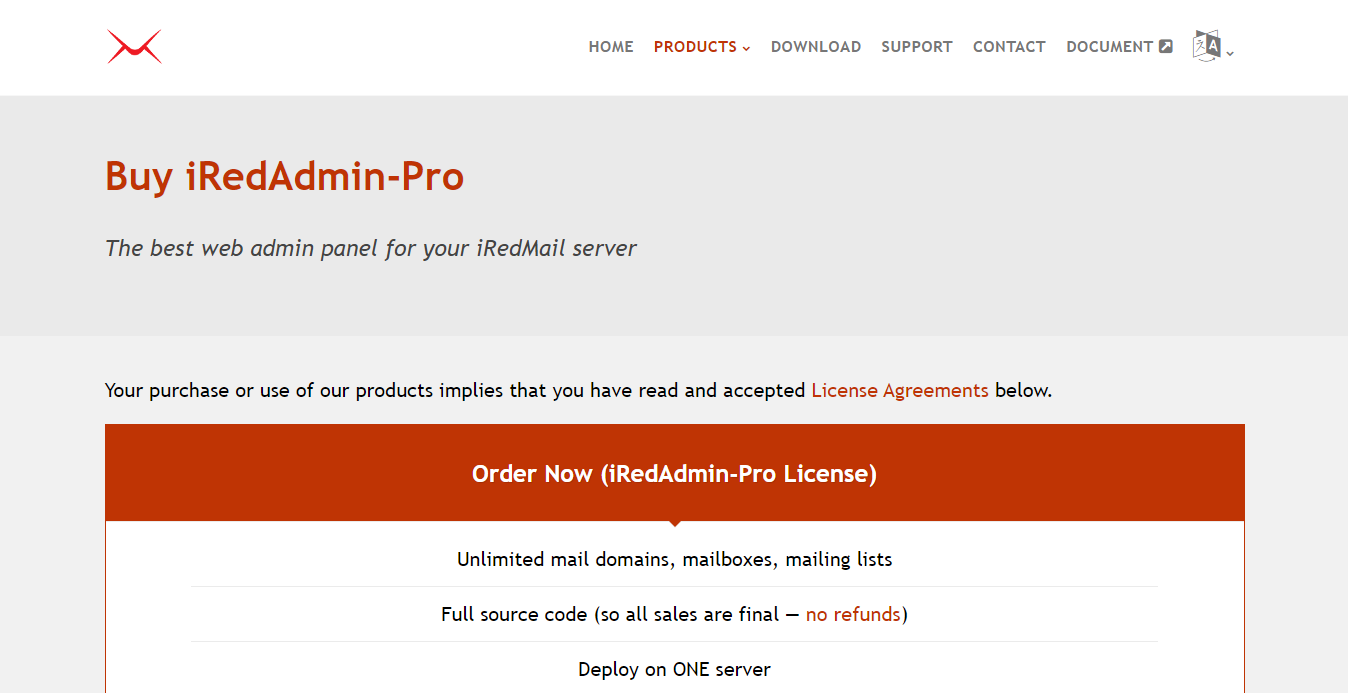
iRedMail offers four pricing plans:
- Free. Free forever for people getting their toes wet with hosting their own email server.
- One year: $499 per license, for startups.
- Two years: $699 per license, for companies.
- Three years: $899 per license, for large companies.
All paid licenses renew at $250 per year.
3. Modoboa
Our Verdict — Best For Customization
Price: Free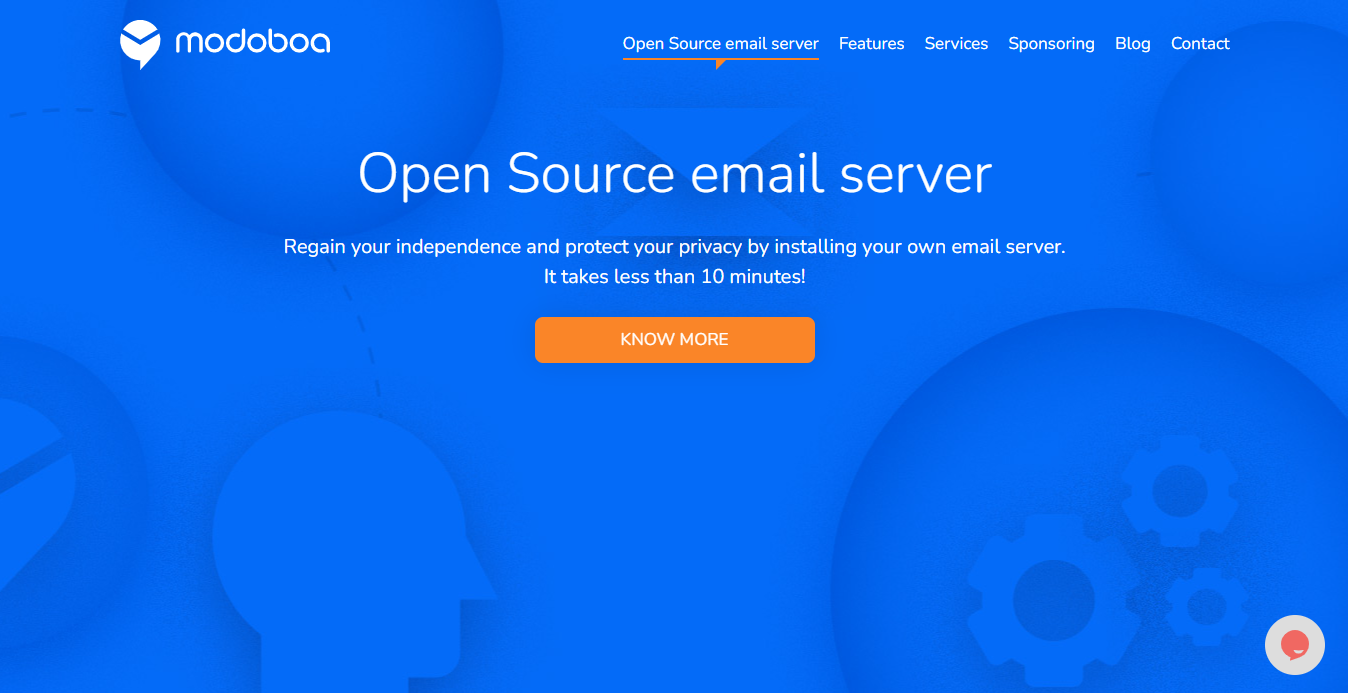
Modoboa is another open-source mail server solution which offers a consistent and professional look and feel. We think it's the best for customization because of how easy and swift it is to customize it all.
The Best Part:
- Seamless operation. Modoboa is designed to be lightweight and swift, guaranteeing quickness and efficiency.
The Worst Part:
- Not very user-friendly. Modoboa is not user-friendly for non-techies. It requires more technical knowledge to be set up and managed than some other options. Even their documentation is super technical.
Get Modoboa if you want a free, open source email server that you can expand at will.
(free forever)
Best For
Modoboa is best for businesses that want a free and customizable mail hosting and management platform.
Top Features
- Easy on developers. Since Modoboa was written in Python 3, the code is easy for developers to read, maintain, and debug. The large and active community of Python developers makes it a breeze to find help and resources for working on Modoboa.
- “Let’s Encrypt” certified. Modoboa is endorsed by Let's Encrypt, a non-profit organization sponsored by many reputable tech companies like CISCO, Chrome, Meta, Amazon Web Services, IBM, and Shopify.
- Add-on services. If you get stuck, you can pay for assistance from the Modoboa team. From one-time jobs like installation, to year-round maintenance of your email server, you can count on them to help you keep your email server running smoothly.
- Up to industry standards. Modoboa comes with great features like webmail, calendars management, and administrator tools, and it offers unlimited domains, mailboxes and aliases.
- Amavis-powered security. Modoboa used the Amavis email filter to block spam, viruses, and other unwanted email messages. You can interact with Amavis on Modoboa to manage its settings and configuration.
Pricing
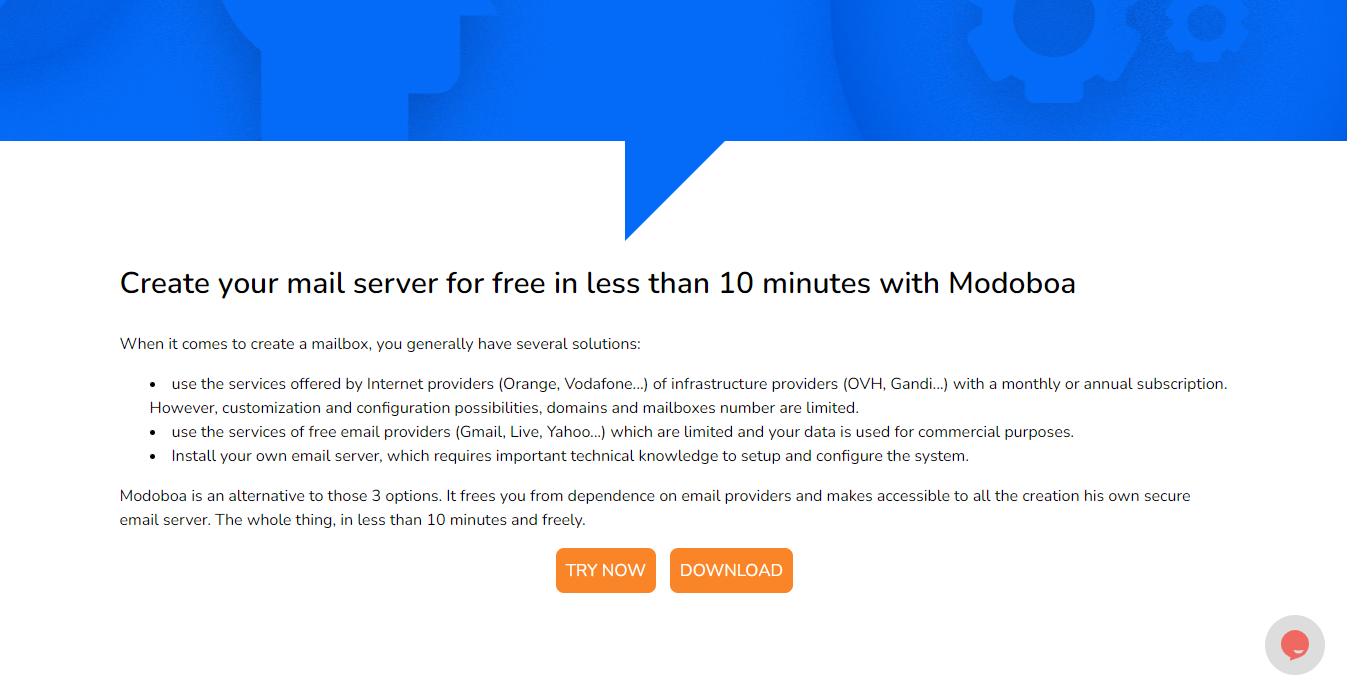
Modoboa offers a single pricing plan:
Modoboa: Free forever!
Try Modoboa today for free.
Our Verdict — Best For Beginners
Price: Free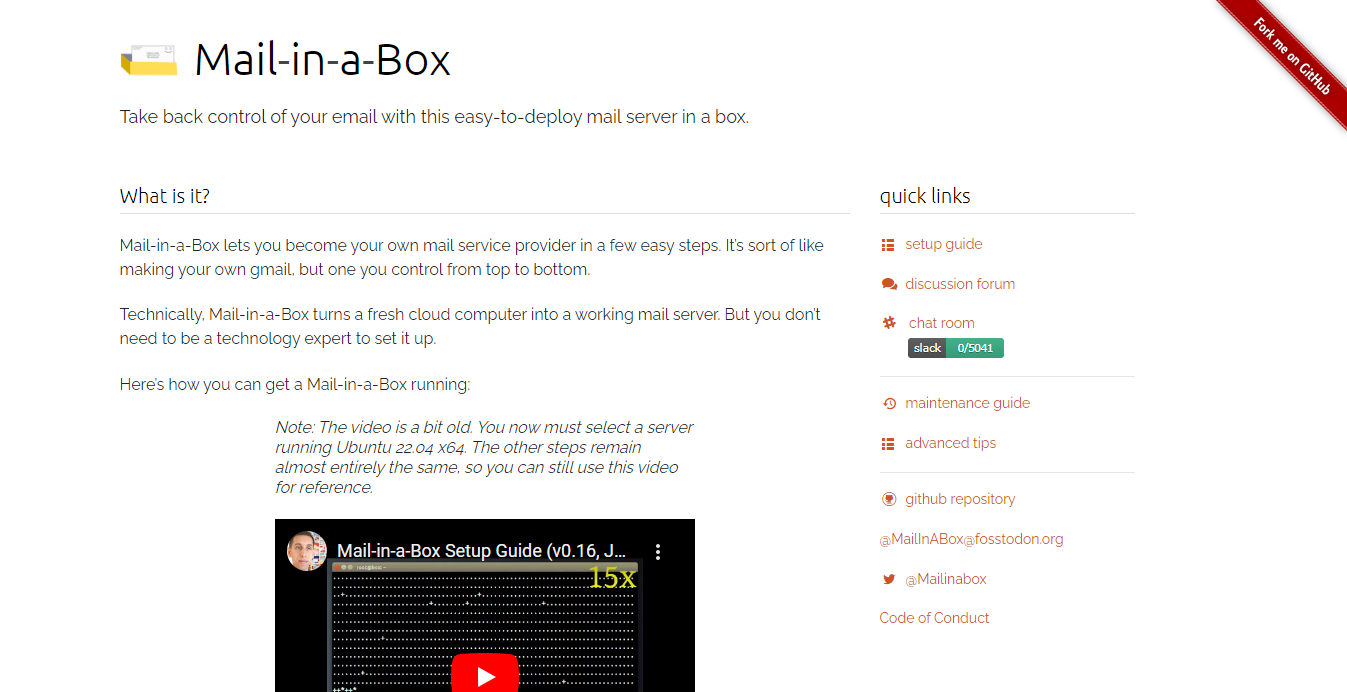
Mail-in-a-Box is an open-source software package that allows users to set up their own mail server quickly and easily. We think it's the best for beginners because it's easy to use and keep, even for users with limited technical knowledge.
The Best Part:
- Lots of third-party integrations. Mail-in-a-Box is designed to work with the most popular webmail services such as Gmail, Yahoo, Outlook.com, and Apple Mail. It can also be used as an alternative to the built-in email server in Microsoft Windows operating systems.
The Worst Part:
- Slow load time. When you have too many inboxes in your system, it can get to a point where it takes too long to load, so make sure you keep it clean and tidy.
Get it if you want a free open source email server that is easy to set up.
(free forever)
Best For
Mail-in-a-Box is best for businesses that want a private mail server that is extra easy-to-use.
Top Features
- Free for life. Save money on monthly subscription fees that are typically associated with commercial email services.
- Automated backups. Mail-in–a-Box is integrated with Amazon S3 to protect your data by regularly creating and storing copies in a secured cloud-based storage service.
- Discussion forum. Mail-in-a-Box has a very active community of users. Whenever you feel stuck, reach out to other Mail-in-a-Box users in the discussion forum to help you figure it out.
- It’s always up-to-date. Mail-in-a-Box features Exchange ActiveSync as a beta feature for latest Outlook version users to access the most current version of their email, calendar, and other personal information data synced up.
- Let’s Encrypt certified. You can trust your files are always safe as your server is certified by Let's Encrypt, a vetted tech-security certification body.
Pricing
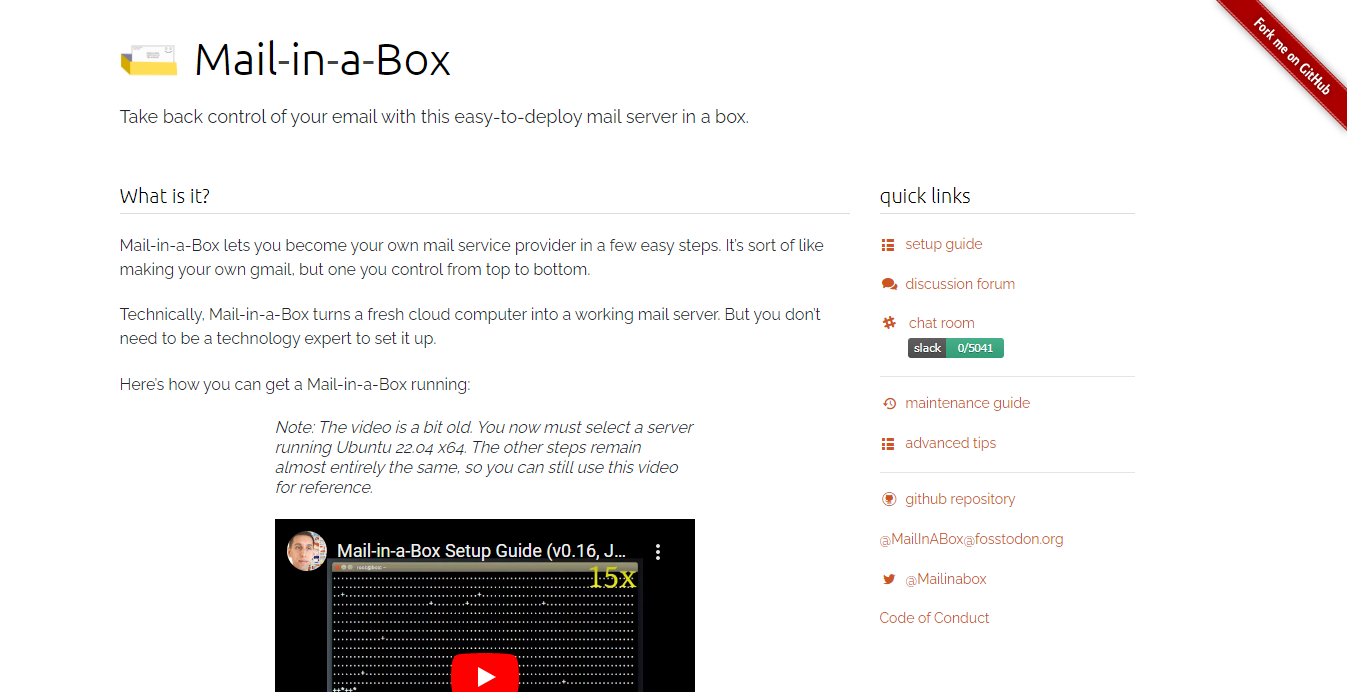
Mail-in-a-Box offers a single pricing plan:
- Mail-in-a-Box: Free forever.
Our Top Three Picks
Here’s a quick summary of our top three picks:
Here’s a quick comparison of our top seven picks:
Tool | Entry Offer | Pricing |
|---|---|---|
MailWizz | None | Starts at $79 |
iRedMail | Free plan | Starts at $499/yr |
Modoboa | None | Free forever |
Mail-in-a-Box | None | Free |
Zimbra | 60-day free trial | Custom |
hMailServer | None | Free forever |
Postfix | None | Free forever |
Here are the top 50 self hosted email servers we considered in this review:
- MailWizz
- iRedMail
- Modoboa
- Mail-in-a-Box
- Zimbra
- hMailServer
- Postfix
- Exim
- Maddy
- Docker MailServer
- Mailu
- Poste.io
- Apache James
- Dovecot
- WildDuck Mail Server
- MailSlurper
- Magma Server Daemon
- Imp
- Chasquid
- Mailcow
- Postal
- Haraka
- Mailpile
- Mailenable
- IceWarp
- Axigen
- OpenEmail
- Atmail
- Mailcow
- Synology MailPlus
- Axigen
- MDaemon
- Scalix
- Zoho Mail
- Kerio Connect
- SmarterMail
- CommuniGate Pro
- GroupWise
- Zarafa
- AfterLogic WebMail Pro
- Roundcube
- ISPConfig
- Citadel
- ProtonMail
- Yandex Mail
- eXchange
- Open-Xchange
- Proton Mail
- Dada Mail
- Intermedia Exchange
What to look for when buying self-hosted email software?
- Compatbility with the email client of choice
- DNS records management
- Flexibility to setup SMTP servers for outgoing and incoming emails
- Compare features with traditional email providers
- Ability to create and manage multiple email addresses
- Support for all of your custom domain names
- Scalable email infrastructure
- Email routing capabilities
- Mailbox storage options for different users
- Straightforward initial setup process
- Spam filtering tools
- Integration with 3rd-party calendar apps
The Bottom Line
Here are our top picks for the best self hosted email server to try this year:


